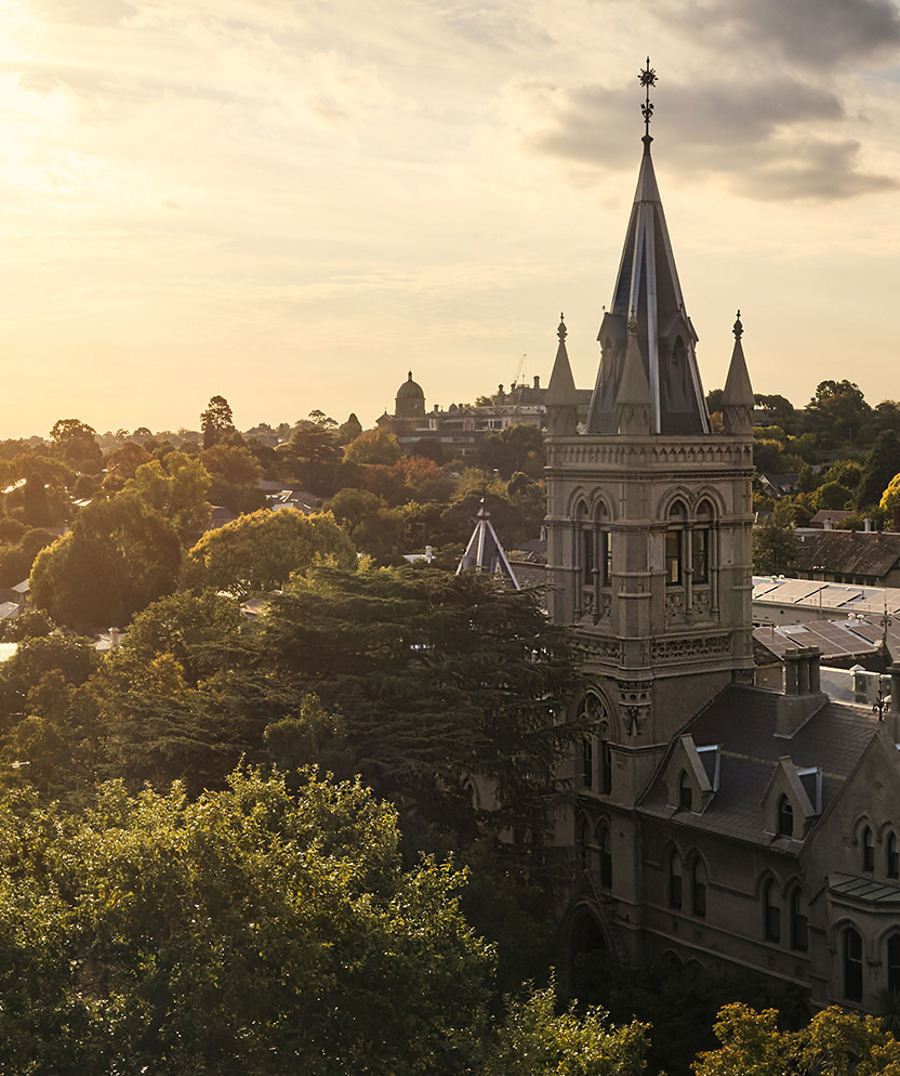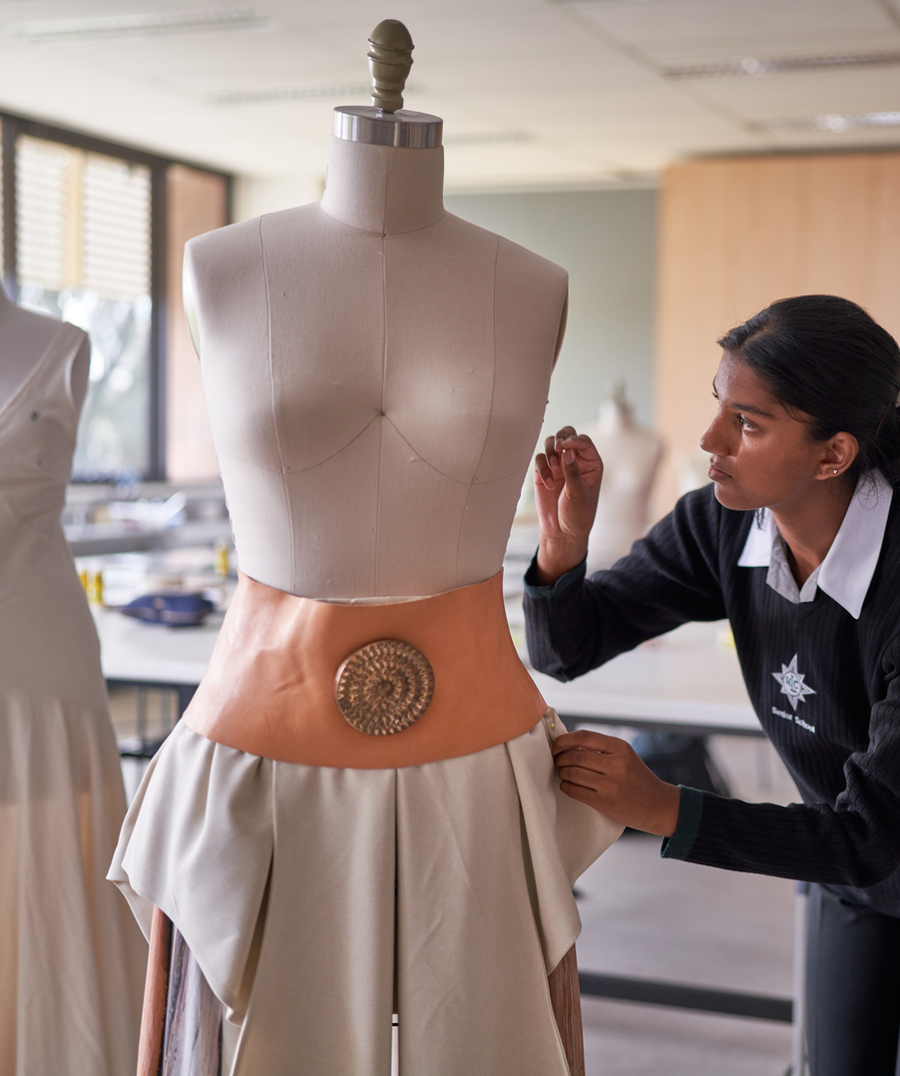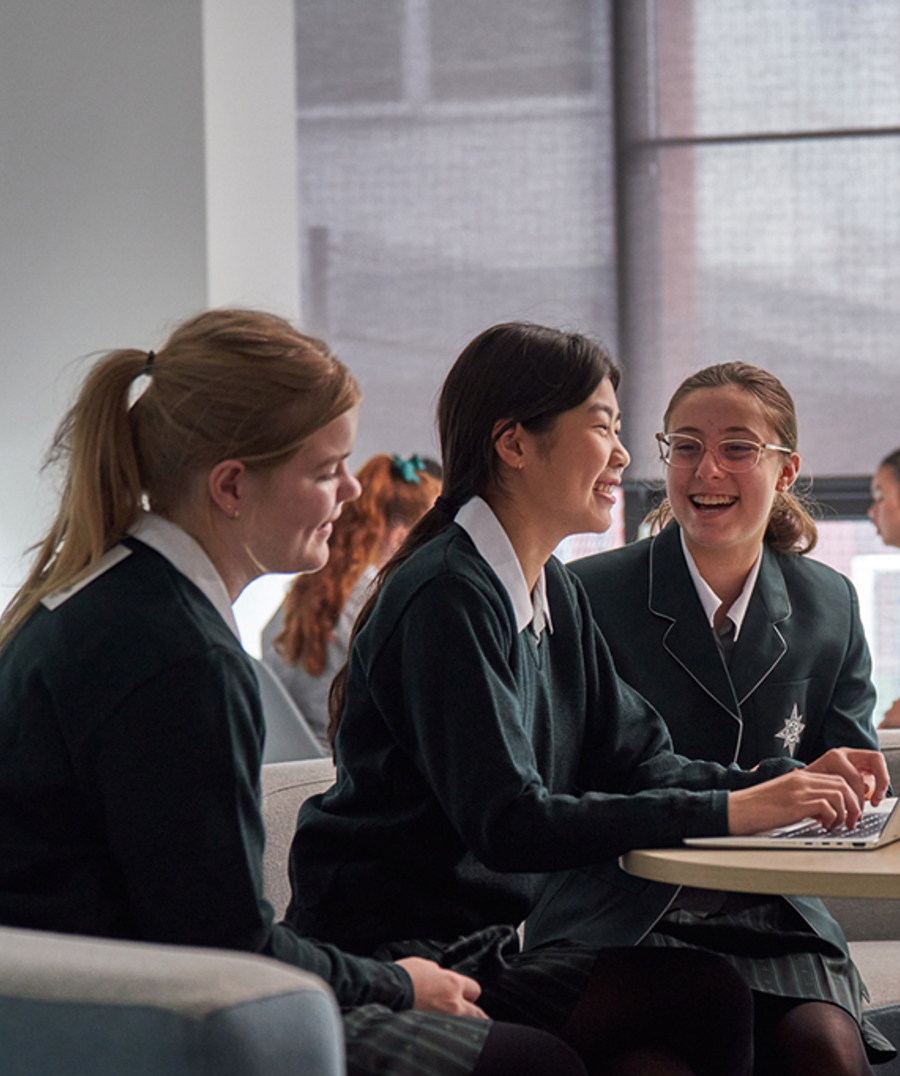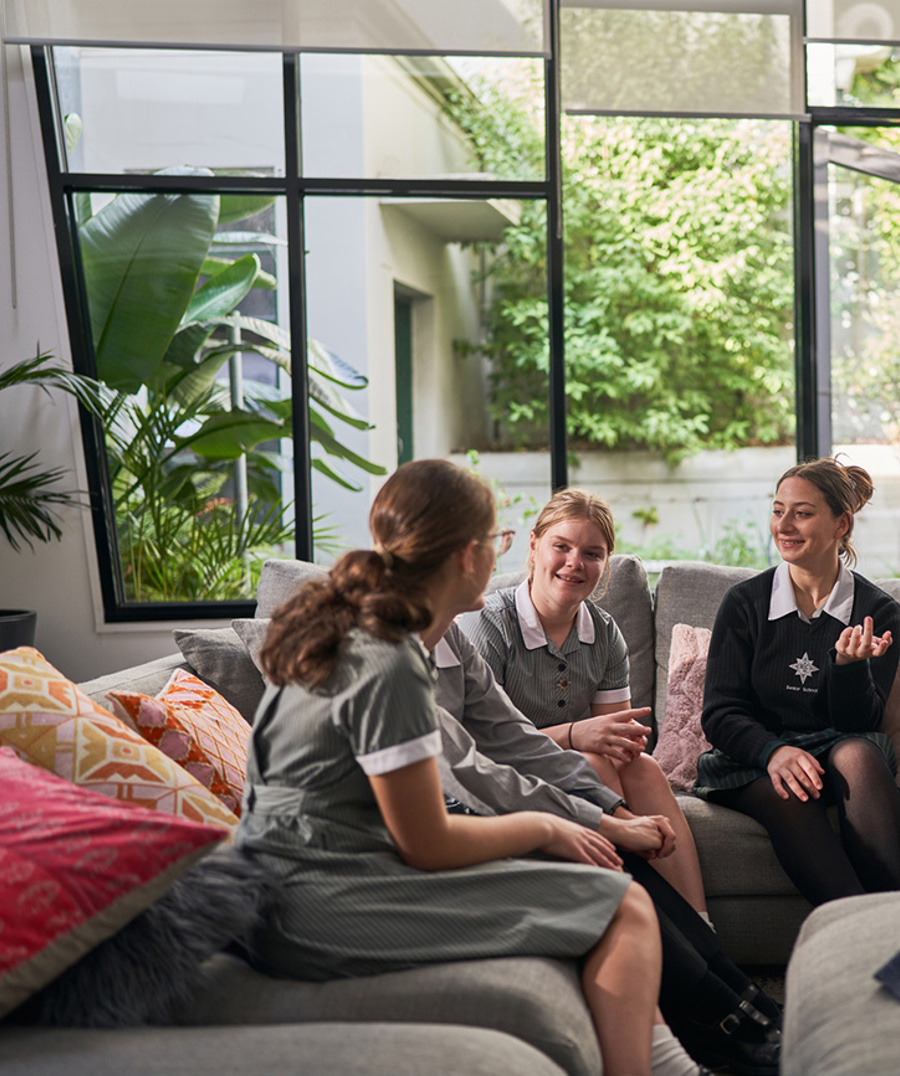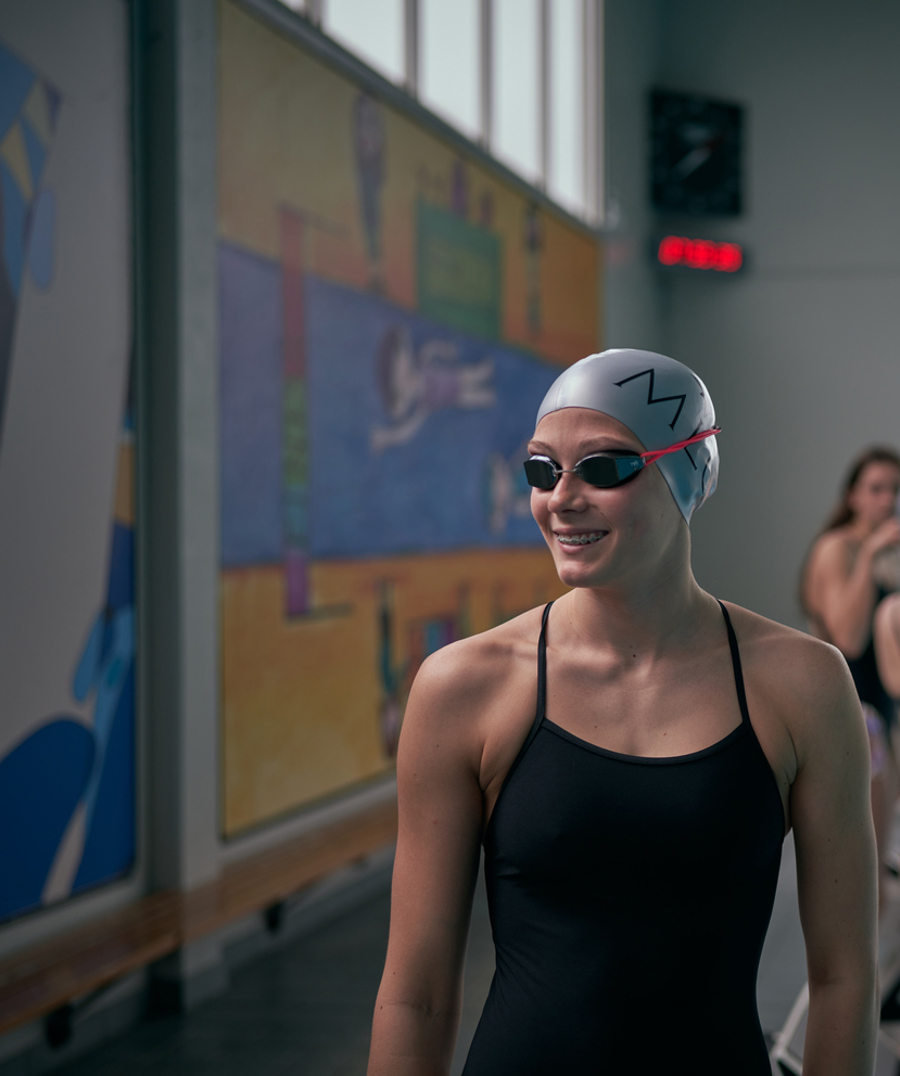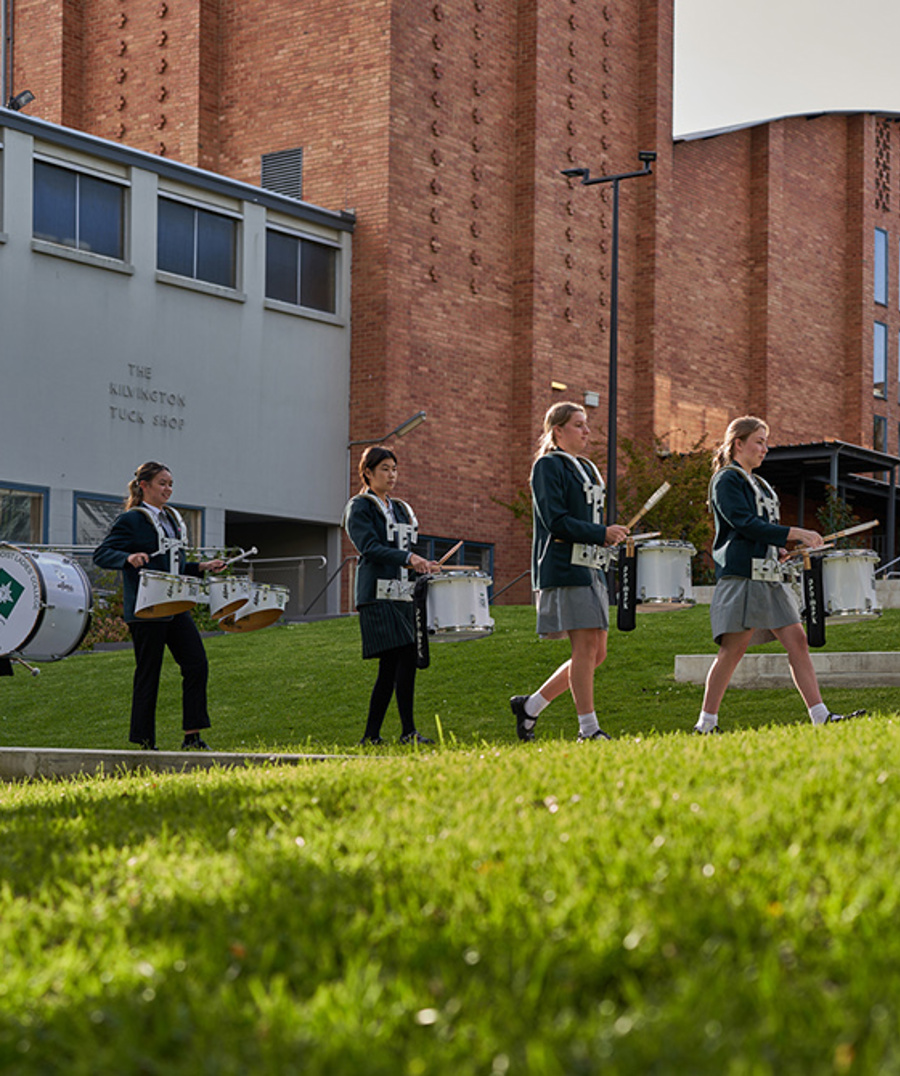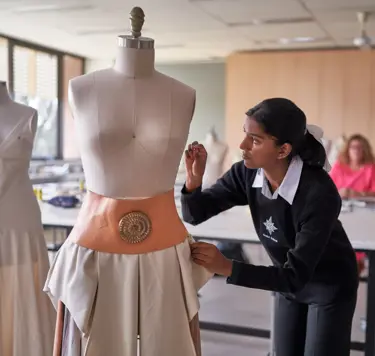
How knowledge builds and builds
With one of the most extensive and engaging curriculum offerings of any non-government school in Australia, we focus on the learning progression of our students by carefully sequencing our subject pathways to ensure that knowledge builds on what was taught earlier and feeds into what will be taught later.
This approach is important in keeping the curriculum coherent by providing ensuring explicit links between subjects, so students don’t see them as disconnected.
The strength and diversity of our learning pathways, subject choice, individualised wellbeing approach, and Education Outdoor programs ensure our students access and enjoy greater freedom and enrichment as they move through their years of learning.
By the time students reach Senior School, they are ready to make their own learning decisions and let their passions and interests guide their final years of schooling. This leads to better results at the end of Year 12 and prepares them well for life.
There are four broad stages of schooling within MLC’s P-12 curriculum, these being:
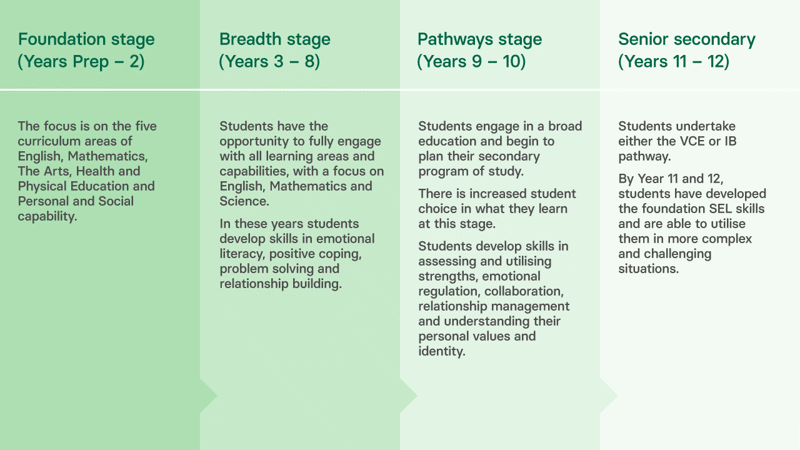
Disciplinary knowledge, skills and understanding are explored in our learning areas:
Our Art and Design Department is one of the largest in Australia. Our Art and Design Department is one of the largest in Australia. It offers students a broad range of subjects, including Art, Photography, Fashion, Product Design and Technology and Visual Communication Design.
Facilities include 13 specialist studios and a purpose-built technology studio fitted with industry-standard software and 3D printers. Starting in Junior School, students have the opportunity to showcase their work at exhibitions, including the mid-year Learning Showcase. In secondary school, students can participate in gallery visits, life drawing classes and the biennial Art and Design tour to Italy in Years 11 and 12.
The Art and Design Department consistently produces high-achieving students with perfect study scores in the VCE subjects. Students' work is often exhibited annually in Top Arts, Top Designs and the IB Schools Visual Arts Exhibitions.
There are two areas incorporating:
1) Visual Arts in which students create visual representations that communicate, challenge and express their ideas. This provides the capacity to engage, inspire and enrich students’ lives, encouraging them to expand their creativity and innovative thinking.
2) Design and Technology which actively engages students in creating quality designed solutions for identified needs and opportunities across a range of technologies contexts. Through the practical application of technologies, students develop dexterity and coordination through experiential activities.
Secondary Learning Pathway:
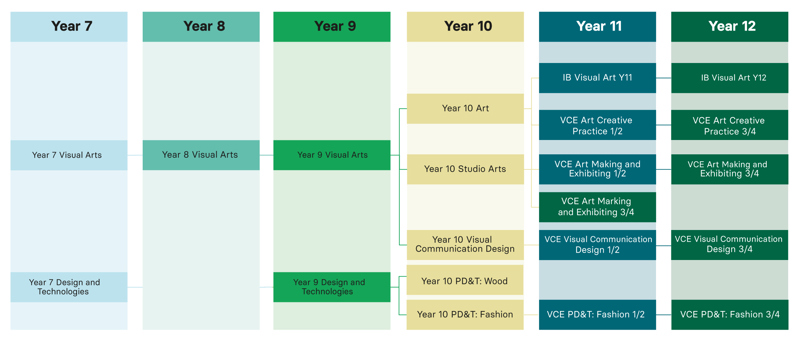
As mass global flows of people, resources, finances and information produce social, economic, political and environmental complexities and challenges, Australia needs enterprising individuals who can make informed decisions and actively participate in society and the economy as individuals and more broadly as global citizens. Young Australians will also face a number of social, economic and moral challenges in their lifetimes that will impact on their lives and choices. It is critical that students are equipped with the knowledge, understanding and skills that will empower them in the face of such challenges.
Civics and Commerce provides students with opportunities to develop enterprising behaviours and capabilities that will equip them to face challenges in their lifetime. Through authentic learning opportunities, the Civics and Commerce curriculum fosters enterprising individuals who are able to effectively embrace change; seek innovation; work with others; show initiative, flexibility and leadership; use new technologies; plan, organise and manage risk; and use resources efficiently.
Civics and Commerce will better place students now and in their adult lives to actively and effectively participate in economic and business activities, while reflecting on the effects of their decisions on themselves, other people and places, now and in the future.
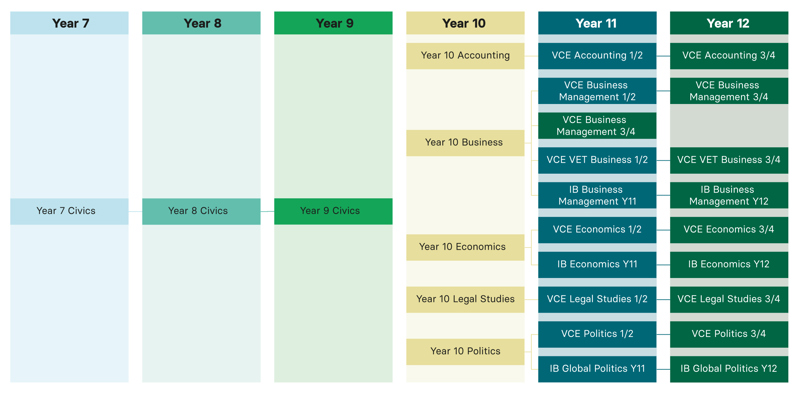
Digital Technology empowers students to shape change by influencing how contemporary and emerging information systems and practices are applied to meet current and future needs. Deep knowledge and understanding of information systems enable students to be creative and discerning decision-makers when selecting, using, and managing data, information, processes, and digital systems to meet needs and shape preferred futures. It provides students with practical opportunities to use design thinking and to be innovative developers of digital solutions and knowledge.
The subject helps students to become innovative creators of digital solutions, effective users of digital systems and critical consumers of information conveyed by digital systems.

Our Dramatic Arts curriculum encourages students to learn to think, move, speak and act with confidence. In making and staging drama, they learn to be focused, innovative and resourceful, and collaborate and take on responsibilities for drama presentations. Students develop a sense of inquiry and empathy by exploring the diversity of drama in the contemporary world and in other times, traditions, places and cultures.
Our commitment to the pursuit of dramatic excellence is reflected in students’ achievements at MLC and beyond. Many students have secured places at nationally and internationally renowned acting training academies. Our students’ achievements have also been recognised through the Victorian Premier’s VCE Awards and the prestigious VCE Season of Excellence Top Class showcase for Victoria’s top performing VCE Drama students.

Students in Years 3 and 4 participate in an annual camp focusing on outdoor adventures and team building. From Year 5 and continuing to Year 9 and beyond, our residential Education Outdoors program is a rewarding, exciting and significant component of every MLC student’s learning experience. We own and manage two dedicated remote campuses – MLC Banksia and MLC Marshmead. Here, students access a range of tailored outdoor learning experiences virtually unrivalled in the state’s secondary education sector.
MLC's Education Outdoors program is centred around three key concepts: personal sustainability, sustainable communities and environmental sustainability. Through hands-on, experiential learning, MLC students develop a profound appreciation of our precious natural environment and develop the skills, knowledge and understanding required to live sustainably, not only as school students but throughout the rest of their lives.
Learn more about our MLC Banksia and MLC Marshmead programs.
Through the study of English, students learn to analyse, understand, communicate and build relationships with others and the world around them. Starting in Junior School, students are introduced to the beauty and power of words through an evidence-based approach to literacy aligning with the research into how to teach foundational literacy skills effectively (Science of Reading). We then ensure that the building blocks and foundations of literacy are solid and consistent across all levels, so that students can fully embrace the study of English.
The study of English plays a key role in developing reading and literacy skills which help young people develop the knowledge and skills needed for education, training and the workplace. It helps them become ethical, thoughtful, informed and active members of society.
Learning English also helps students to engage imaginatively and critically with literature to expand the scope of their experience. As students progress, our English curriculum expands in depth and scope, introducing students to varied texts and literature, from past and present, including works by Aboriginal and Torres Strait Islander Peoples and varied works from Asia.
Specialised curriculum areas include:
- English
- English as an Additional Language (EAL)
- English Language
- Literature
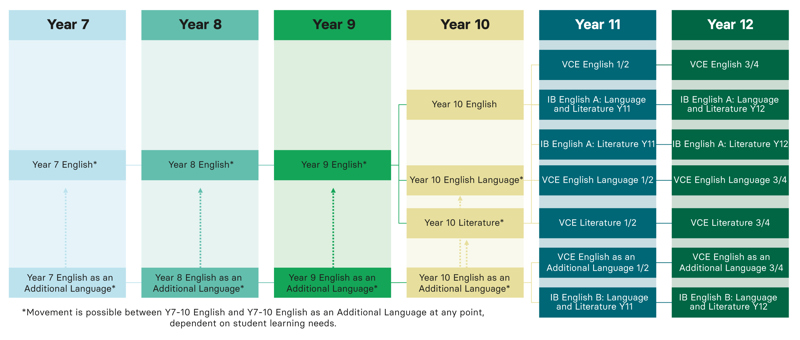
The Health, Food and Hospitality curriculum is designed to provide students with the knowledge and skills needed to understand the importance of a healthy lifestyle and make informed choices regarding food and nutrition. This curriculum covers a range of topics related to health, food, and hospitality, including nutrition, food preparation and safety, culinary arts, and hospitality management.
The Health, Food and Hospitality curriculum encompasses three distinct but related areas:
- Food
- Health
- Hospitality
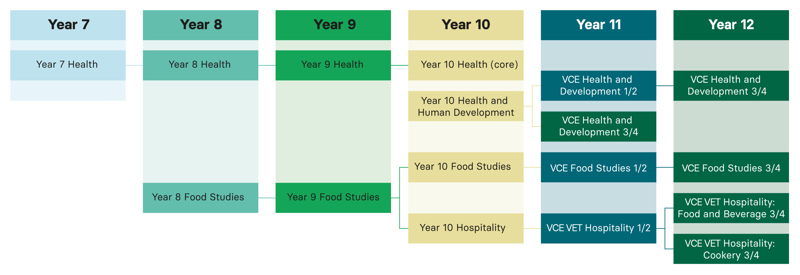
The Humanities provide a framework for students to examine the complex processes that have shaped the modern world. Junior School students experience Humanities through their Linked Learning units.
In History and Geography, students explore the processes that have shaped and continue to shape different societies and cultures, appreciate the common humanity shared across time and distance, and evaluate how humans have faced and continue to face different challenges.
In Philosophy, students deal with questions of ethics, epistemology and metaphysics. Philosophy is the founding discipline of logic and continues to develop and refine critical reasoning tools, influencing approaches in mathematics, digital coding, science and the humanities. Philosophy students grapple with the problems that lie at the foundation of issues of public debate, such as artificial intelligence, justification for a charter of human rights and freedom of speech.
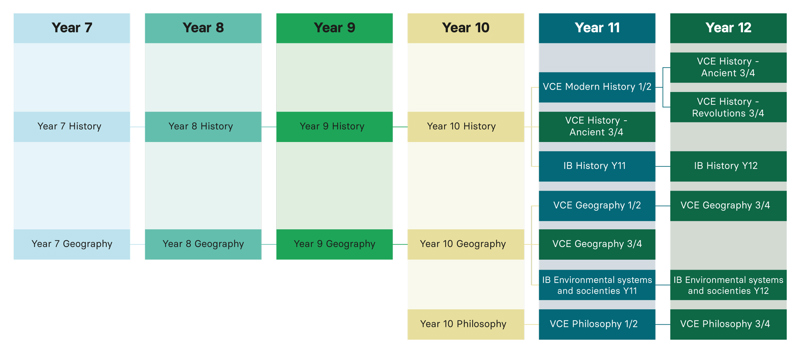
All students in Years 7-10 will engage in Interdisciplinary Studies in addition to their discipline-based subjects. Even though secondary education usefully organises learning into disciplinary areas, our ever-changing world also demands an education that empowers people to integrate knowledge in novel and creative ways. It will engage students in real-world learning and design thinking that will be key to their future endeavours.
Interdisciplinary learning is designed to support students in understanding bodies of knowledge from two or more disciplines or subject groups in order to integrate them and create a new understanding. Students will bring together concepts, methods, or forms of communication from two or more disciplines to explain a phenomenon, solve a problem, create a product for a ‘client’, or raise a new question in ways that would have been unlikely through a single discipline.
Students undertake project-based learning and work in small teams on a particular issue, problem or project. This will be undertaken within two periods every cycle. Each year level will have a different focus area, for example:
- Year 7 Local Clients
- Year 8 Global Changemakers
- Year 9 Local Urban Project
- Year 10 Entrepreneurship and Social Enterprise
Learning languages broadens students’ horizons in relation to the personal, social, cultural and employment opportunities that an increasingly interconnected and interdependent world presents. In Junior School, students learn Japanese from Prep-Year 4, then French in Years 5 and 6. Studies in these areas provide a solid base for further language learning in secondary school.
Languages form part of the core program from Year 7 to Year 10. As part of exploring different options and increasing exposure, students choose two languages to study in Year 7, and then continue one until the end of Year 10. At MLC, the following languages are offered in secondary school:
- French
- French (Partial Immersion)*
- Chinese
- Japanese
- Spanish (Year 9 onwards).
In Senior School, students can continue studying their languages in either VCE or IB. Admission into VCE and IB languages is subject to a placement test to ensure that students study the appropriate level of language. IB Ab initio courses are beginner courses.
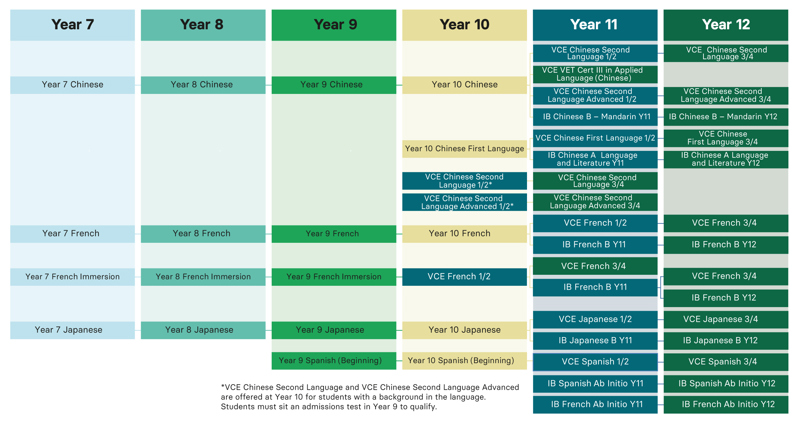
* The French Partial Immersion program is a three-year learning experience. Commencing in Year 7, students undertake course work for History, Geography, and Science entirely in French, alongside French language classes. This experience continues in Year 9 with an advanced French class and preparation for the DELF B1 exam.
After completing the program, students are equipped to advance to VCE French in Year 10, one year ahead of their peers. Prior French learning experience is favourable but not mandatory for the program. Students must apply to study this program.
The Mathematics curriculum provides students with essential mathematical skills and knowledge in number and algebra, measurement and geometry, and statistics and probability. It develops the numeracy capabilities that all students need in their personal, work and civic life. It provides the fundamentals on which mathematical specialties and professional applications of mathematics are built.
In addition, we find that teaching mathematics well, especially at a junior levels, is as much about instilling confidence as learning fundamental skills.
The Mathematics curriculum focuses on developing increasingly sophisticated and refined mathematical understanding, fluency, reasoning, and problem-solving skills. These proficiencies enable students to respond to familiar and unfamiliar situations by employing mathematical strategies to make informed decisions and solve problems efficiently.
The mathematics curriculum also ensures that the relationship between the various components of mathematics and other disciplines are made clear.
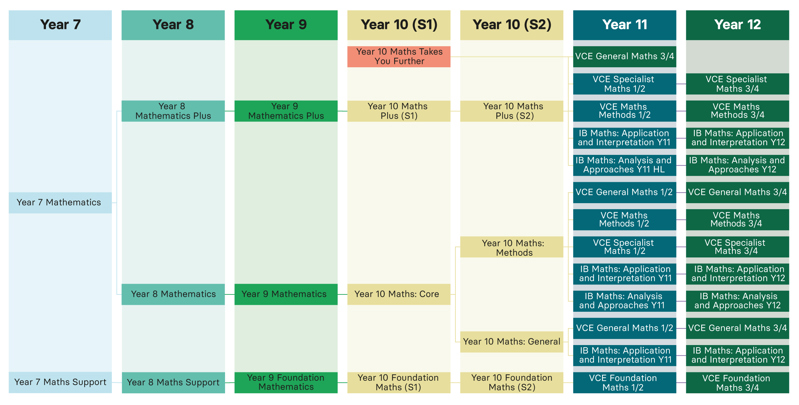
Music can engage, inspire and enrich all students, exciting the imagination and encouraging students to reach their creative and expressive potential. Music is an integral part of the curriculum in Junior School (Prep-Year 6) and from Years 7-9 before becoming an elective pathway from Year 10 onwards. As students progress, they learn to value and appreciate the power of music.
Through continuous and sequential music learning, students listen to, compose and perform with increasing depth and complexity. Through performing, composing and listening with intent to music, students have access to knowledge, skills and understanding which can be gained in no other way.

At the core of Physical Education is the acquisition of movement skills and concepts to enable students to participate in a range of physical activities – confidently, competently and creatively. As a foundation for lifelong physical activity, participation and enhanced performance, students acquire an understanding of how the body moves and develop positive attitudes towards physical activity participation. They develop an appreciation of the significance of physical activity, outdoor recreation and sport in Australian society and globally.
Integral to all PE programs is a variety of opportunities for participation, cooperation and leadership. The excellence of the MLC Physical Education and sport experience derives from the quality of our extensive teaching and coaching team. With 24 Physical Education teachers and around 130 specialist, sports coaches, our staff have the skills, drive and imagination to make every class and team experience inspiring and enjoyable.
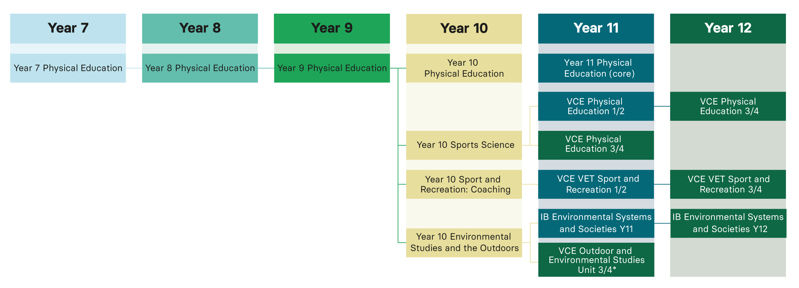
Science provides an empirical way of answering interesting and important questions about the biological, physical and technological world. The Science curriculum provides opportunities for students to understand important scientific concepts and processes, the practices used to develop scientific knowledge, the contribution of science to our culture and society, and its applications in our lives. The curriculum supports students in developing the scientific knowledge, understanding and skills to make informed decisions about local, national and global issues and to later participate, if they so wish, in science-related careers.
Science in Junior School is often facilitated through the Linked Learning units and is conducted as a stand-alone subject.
In addition to its practical applications, learning science is a valuable pursuit in its own right. Students can experience the joy of scientific discovery and nurture their natural curiosity about the world around them.
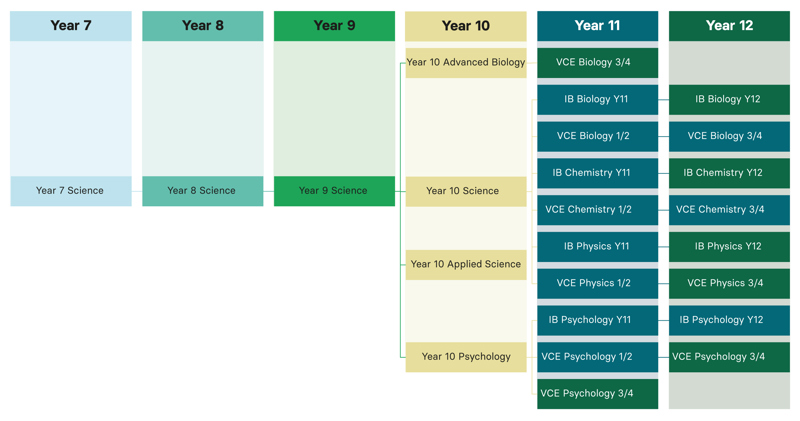
Please note that the pathways outlined are indicative, and subject offerings are subject to change.
